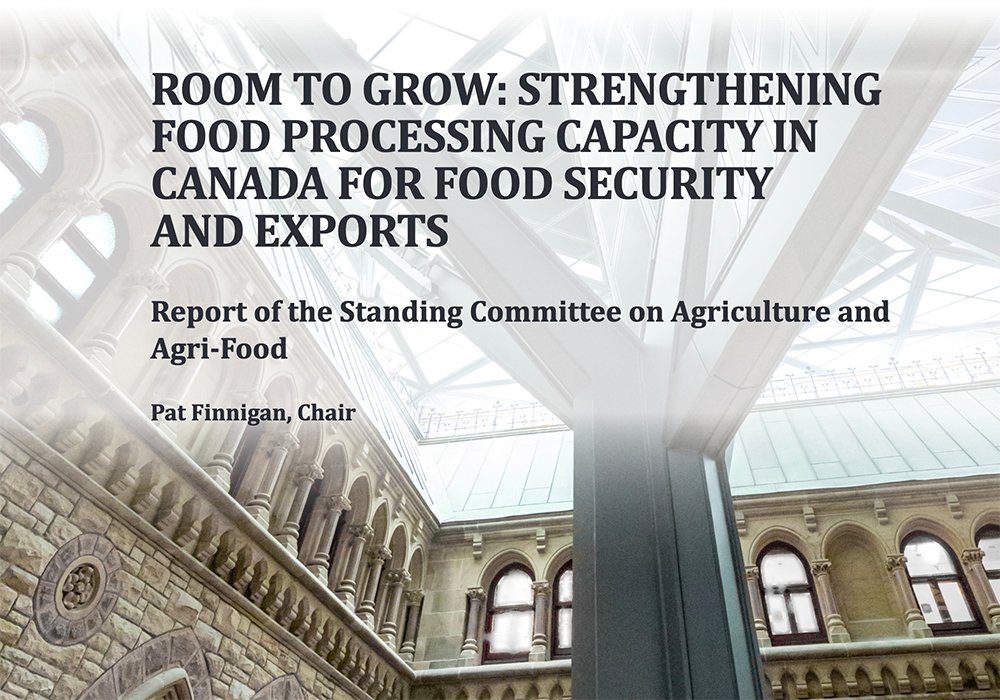Committee suggests aid for processor sector

A federal agricultural committee report is recommending more investment and less regulation to spur the Canadian processing sector.
Between November 2020 and February 2021, the standing committee on agriculture and agri-food studied measures to increase Canada’s processing capacity, hearing from dozens of witnesses.
The result is 18 recommendations largely focusing on financial investments and policy reforms.
MPs from each of Canada’s major political parties took part in conducting the study, called Room to Grow: Strengthening Food Processing Capacity in Canada for Food Security and Exports.
“It became abundantly clear over the course of our study that increasing the amount of food that is processed and manufactured in Canada would not only help expand our economy, but also help strengthen local food chains,” committee chair and Liberal MP Pat Finnigan said in a statement.
The report authors recognized the role food and beverage processing firms play in Canadian agriculture.
“Food and beverage processing firms play a significant role in Canadian agriculture and agri-food. These firms purchase approximately 40 percent of Canadian farms’ agricultural output and sell over 70 percent of their processed output to Canadian retailers and food service providers,” the report says, also noting the near $40 billion in processed agri-food exports.
Throughout the study, there was continued emphasis on the concentration of Canada’s slaughterhouse and meat packing industry. The COVID-19 pandemic brought this issue to the forefront for many Canadians as they watched costs climb.
“Currently, three federally regulated plants (a JBS plant in Brooks, Alta., and two Cargill plants in High River, Alta., and Guelph, Ont.) are responsible for processing 85 percent of the beef that Canadians consume,” the study said, citing a Statistics Canada report.
Several witnesses spoke of the closing of smaller, regional abattoirs in recent years and the difficulties farmers and ranchers faced as a result.
Other witnesses noted capacity levels at meat packing plants had reached and at times exceeded 100 percent.
“Limited access to meat processing facilities, particularly federally inspected ones that allow producers to sell their product nationally and internationally, can have a significant impact on local food production,” the report concluded.
An investment in infrastructure, including transportation systems, to improve access to markets and support a modern supply chain was one recommendation put forward.
The committee also recommends the federal government “modernize its regulations and implement targeted programs, in collaboration with the provinces and territories, to encourage the development of local processing businesses and regional small-scale abattoirs.”
A similar recommendation calls for Ottawa and the provinces to identify “strategic funding opportunities to address regional processing capacity to strengthen Canada’s agri-food supply chain.”
Several witnesses testified to the committee that regulatory difficulties made it difficult to access start-up capital when trying to improve local food processing infrastructure.
Maple Leaf Food’s Nadia B. Thompson addressed this during her testimony, telling MPs that “perhaps more troubling to us is that many regulations are either outdated or focused too heavily on prescribing a process than ensuring an outcome. This deters innovation and solutions that would improve health, safety, and environmental outcomes and stymies much-needed investment to our country. The ultimate results are additional cost, distrust between industry and regulators, and an overall less-than-efficient system that prevents us from living up to our true potential on both health and safety and global competitiveness.”
To combat ongoing labour shortages that threaten processing capacity, MPs on the committee recommend increasing the number of temporary foreign workers food processing facilities are allowed to hire, and work to make the agri-food sector more attractive for Canadians to work in.
The committee concluded Canada’s concentrated grocery retail sector creates challenges for processors’ ability to innovate and grow.
It calls on the federal government to support the creation of a grocery code of conduct to “standardize the relationship between food suppliers and retailers.”

